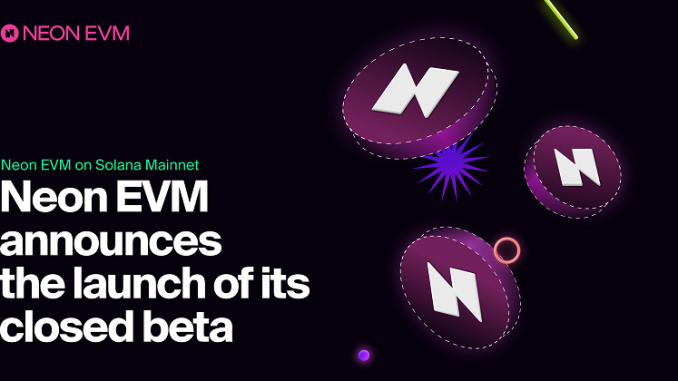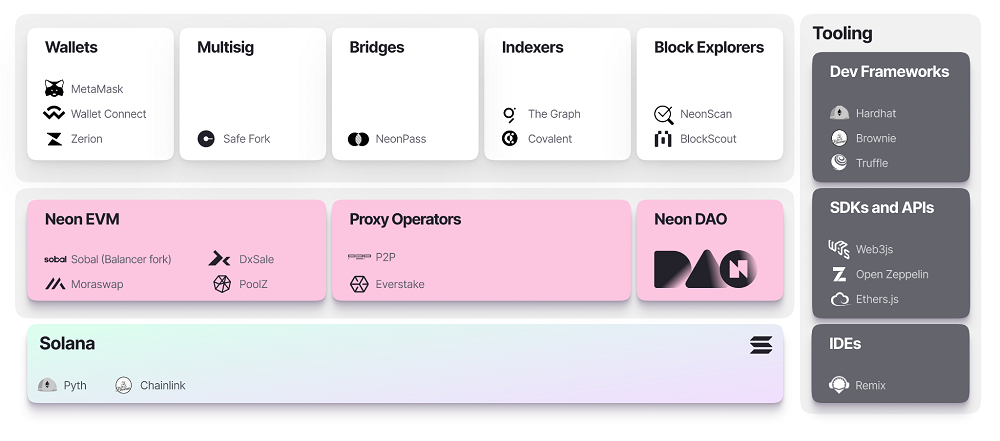
Neon EVM is a low-friction solution that enables Ethereum dApps to settle transactions on Solana.
The EVM helps breach the gap between Ethereum and Solana.
Since the Neon EVM beta is closed it will only accept transactions for those on the guest list.
What is Neon EVM?
Neon EVM is a low-friction solution that enables Ethereum dApps to settle transactions on Solana, eliminating the gap between these two leading blockchains.
Neon EVM positions Ethereum developers to enjoy the best of Solana’s network, from low fees to high transaction speeds, and parallel transaction execution capabilities.
While Solana is one of the fastest, organically-growing chains, its incompatibility with EVM has left several hundred million in TVL, millions of users, and an entire ecosystem untouched by EVM multichain dApp developers — until now.
Neon EVM’s pioneering solution is the anticipated innovation in the Solana ecosystem and makes Solana a viable option for multichain builders. Neon EVM brings together the best of both chains while ensuring the finality of settlements on Solana.
What is Neon EVM closed beta?
The launch of the closed beta version of Neon EVM, Neon EVMβ, to Solana’s Mainnet is a significant milestone on the roadmap.
Neon EVMβ is a fully-functioning Neon EVM with one major alteration: it supports fee-free transactions.
This means that all transactions are settled to Solana’s L1 and require payment in Sol, as per any Solana-settled transaction. However, in beta, the NEON token is not requested by the Proxy Operator responsible for accepting the transaction request and ensuring that it is finalized.
Why launch in beta?
The Neon EVM ecosystem includes many more players than just the Neon EVM and the Proxy Operators that accept and settle transaction requests. It includes DAO, oracles, indexers, wallets, multisigs, bridges, explorers, and more. Neon EVMβ provides an opportunity for all parties to deploy and test to ensure the seamless integration of their services before the official Solana Mainnet launch.

While Neon EVM could have chosen to do a Shadow Mainnet launch on a fork of the Solana mainchain, launching directly to Mainnet offers significant advantages. Not least of which is that deployed and tested contracts will retain their addresses on Solana Mainnet.
Why launch in closed beta?
Launching in closed beta allows the Neon EVM team to onboard and test the services of ecosystem players in controlled phases. The first phase onboarded the infrastructure components, and the second phase accepted dApps and will test the connection of wallets.
Operating in closed beta also controls the budget by keeping the activity limited to an invite-only list. Remember, while the Proxy Operator is not charging a fee, the Solana network still does. It simply is not possible to provide an open beta and predict the cost in SOL for such an initiative (though it is possible to predict that the SOL cost will be less than the equivalent Eth cost would be for an EVM settling to Ethereum!).
When the testing period ends and NEON tokens are available on the market to pay for transactions, Neon EVM will switch back to its normal operation mode. This means that independent Proxy Operators (P2P and Everstake) will resume responsibility for accepting and processing transactions. The Proxy Operator’s RPC endpoints will be made available on ChainList.
Want to get involved?
While Neon EVM is deployed to Solana Mainnet at address NeonVMyRX5GbCrsAHnUwx1nYYoJAtskU1bWUo6JGNyG, as this is a closed beta, unless you are on the guest list, it won’t accept your transactions yet.
To engage with the community, you can find us on Twitter and join Neon EVM’s very active Discord to meet some of our long-term and loyal community builders. For a high-level overview of the technical architecture and features of Neon EVM, the whitepaper is available at NeonEVM.org/whitepaper.pdf. To follow the activity of the network, you can view Neon EVM transactions settled to Solana with the NeonScan dashboard.





Be the first to comment